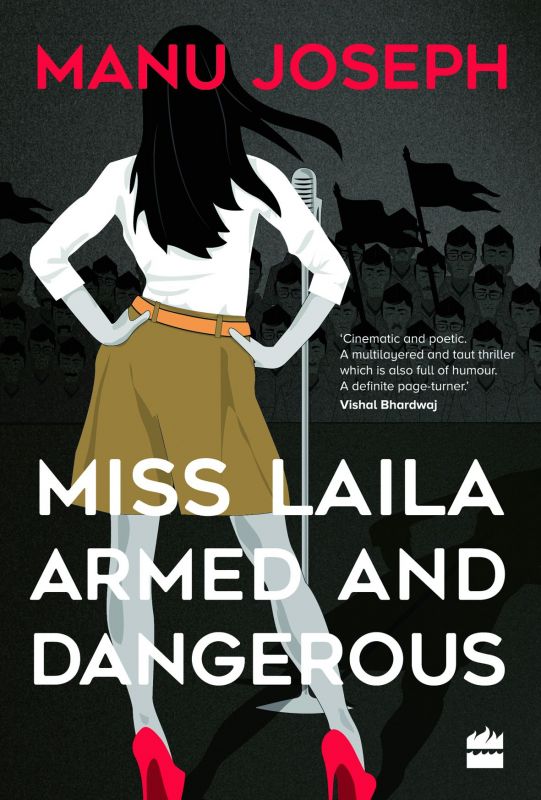The way we are
Manu Joseph lampoons the entire system with wicked humour and sarcasm in a satire that takes up a chapter of recent history.

It’s a black cover. Grey-black. In the middle of all that darkness is a woman facing the other way, an audience, you gather, when you look closely. The woman appears to be doing a performance of sorts; there is a mike in front of her. She’s wearing a white shirt and khaki shorts. And a belt. If you are imaginative enough, you will put a man in her place and think of the RSS uniform. Manu Joseph must have begun his thoughts from the other end, the men in those uniforms, and then imagined a woman in one. But then it is not his Miss Laila, armed and dangerous, on the cover. That’s just the title of the book printed over Akhila Iyer. The other woman in Manu’s book. Only literally. This is not really a love story, unless you can read some love between a man and a woman in a car whose words you don’t hear, but who you follow for a long time. You can also read some among worshipping siblings, and the confused childhood memories of a daughter. There might also be love of a different kind, not the one between humans, but the more familiar, the more lasting one for power.
Manu Joseph may have meant all of that or perhaps none, when he began writing the book three years ago. He says, “The story changed in fundamental ways over this period, but two elements did not. One was an idea I have been consumed by for many years — of a man in the debris of a building saying something about an event that is unfolding in the outside world. The other I do not wish to talk about.”
 Miss Laila, Armed and dangerous by Manu Joseph Rs 350, pp 224 Fourth Estate.
Miss Laila, Armed and dangerous by Manu Joseph Rs 350, pp 224 Fourth Estate.
That is where the book begins. Akhila Iyer running to this building that collapsed and hearing about a man stuck under it, one they are all trying to reach. The man seems unimportant till he begins to blurt out about a bomb and a man called Jamal who set out with it. But this man is not in his senses, not conscious. Yet, his words are strong enough to worry men that run things. Phone calls appear as chapters in Manu’s book, revealing familiar real life characters.
“I thought, why not. What is the difference between a big change in a name and small change. Fiction is fiction,” he says.
These are characters so much in the news that you wonder if the book is simply the thoughts and reactions of Manu, the journalist. Everything from the Gujarat riots to the CM of the time, ‘Damodharbhai’, who slowly emerges as the PM ‘that a nation has fallen in love with’. The building collapse happens at the time the assembly elections have got over and the winner is declared. And more familiar characters from political India come into the picture.
Manu seems cool about what the reactions will be. “As I am generally a happy and pleasant person I never ‘expect’ unpleasant reactions. I, in fact, hope to make people happy, even some people who are incurably afflicted with very profitable negativity. I hope that something that they see in the book would open an inner eye and make them laugh and go do some work. But there have been some unpleasant reactions. Not from the Right fundamentalists, but from the Left fundamentalists,” he says.
The title character is perhaps the most real. She is beautiful at 19, looking after a family bereaved of the father. Manu puts an adorable little sister Aisha to describe Laila and her mysteriousness. He also uses another character – Mukundan – a Malayali in Mumbai, to narrate quite a chunk of the story, through his mostly neutral thoughts.
After his last book, Illicit Happiness of Others, a Malayali is again in the core of his book. “I can write the mind of a typical Malayali male in my sleep. The challenge is to make that mind look good and likeable. That, if you know Malayali men, is not so easy,” Manu, a Kottayam-born, says.
In some places, especially among Akhila Iyer’s thoughts, you catch bits of the author’s voice. She appears to have harsh views on activism. “Activism is extremely important and these days very powerful. As a result, it is adorable and despicable. It needs to be understood and analysed, but what has happened is it has become a new religion and like religion, it has both good and evil encoiled within it.”
He goes on to quote an old man in the novel: “Activism is always a feudal system in which nobodies are in the care of somebodies. It begins in a special moment when the elite of a system become the underclass in another system. When the elite of a system become the underclass in another system, they search for a moral cause to restore balance of power. This is popularly known as activism… Activism is always a retaliation of the elite, always couched in morals and always a feudal system where the strong employ the weak, the poor, the demented, the suicidal, the semi-literate and other losers of the society.”

